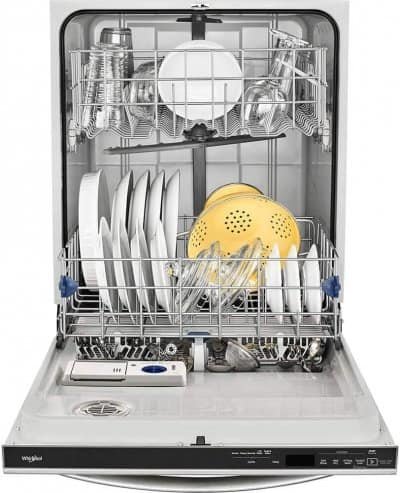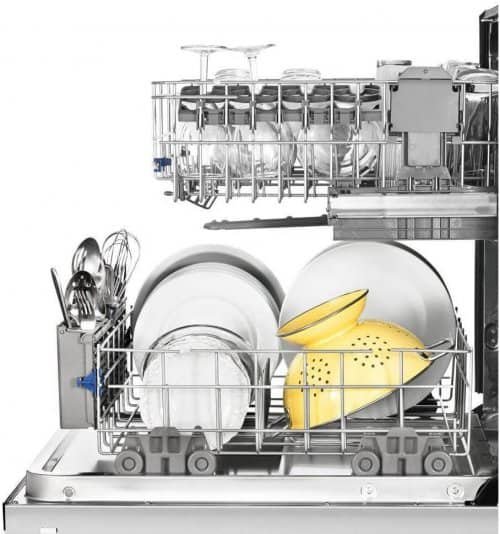When it comes to kitchen appliances, having a well-functioning dishwasher can be a time and energy saver. However, you might be wondering if you need a garbage disposal in conjunction with your dishwasher. In this article, we will explore the role of a garbage disposal, its benefits, and whether it is necessary for your dishwasher setup.
Table of Contents
What is a garbage disposal?
A garbage disposal, also known as a waste disposal unit or garburator, is a device installed under your kitchen sink that grinds food waste into small particles, allowing it to be easily flushed down the drain. It is typically powered by an electric motor and features sharp blades that break down the waste.
How does a garbage disposal work?
When you turn on the garbage disposal, the motor spins the blades, which chop the food waste into fine pieces. The food particles are then mixed with water and flushed through the plumbing system, eventually reaching the municipal sewage or septic tank.
The benefits of having a garbage disposal
- Reduces kitchen waste
- Prevents clogged pipes
- Promotes eco-friendly practices
- Reduces kitchen waste: A garbage disposal provides a convenient way to dispose of food scraps, reducing the amount of organic waste that ends up in the trash bin.
- Prevents clogged pipes: By grinding food waste into small particles, a garbage disposal helps prevent clogs in your kitchen pipes, reducing the need for costly plumbing repairs.
- Promotes eco-friendly practices: Sending food waste to a landfill contributes to greenhouse gas emissions. With a garbage disposal, organic waste can be processed at wastewater treatment plants, where it can be converted into biogas or fertilizer.

Do you need a garbage disposal for a dishwasher?
- The role of a garbage disposal in dishwasher installation
- Alternatives to a garbage disposal
The role of a garbage disposal in dishwasher installation
While it is not strictly necessary to have a garbage disposal for a dishwasher, it can be beneficial in certain situations. When a dishwasher drains water after a wash cycle, the food particles and debris need to be flushed out effectively. A garbage disposal can help break down any remaining food waste, preventing it from clogging the dishwasher drain or the plumbing system.
Alternatives to a garbage disposal
If you don’t have a garbage disposal or prefer not to install one, there are alternative methods to prevent clogs and ensure efficient dishwasher drainage:
- Pre-rinsing: Scrape off excess food from plates and utensils before loading them into the dishwasher. This practice reduces the amount of debris that enters the dishwasher drain.
- Sink strainer: Place a sink strainer or filter over the drain opening to catch larger food particles. Empty the strainer regularly to prevent it from becoming clogged.
Factors to consider when deciding on a garbage disposal
When choosing a garbage disposal for your kitchen, consider the following factors:
- Size and power
- Noise level
- Durability and warranty
- Installation and maintenance
Size and power: Garbage disposals come in different sizes and power ratings. Select a unit that suits your household’s needs and the available space under your sink.
Noise level: Some garbage disposals can be noisy during operation. Look for models that offer quieter performance if noise is a concern for you.
Durability and warranty: Invest in a garbage disposal that is built to last and comes with a warranty. Stainless steel grinding components tend to be more durable than other materials.
Installation and maintenance: Consider the ease of installation and maintenance requirements when choosing a garbage disposal. Some units may require professional installation, while others are designed for DIY installation.
Installation process for a garbage disposal
Installing a garbage disposal typically involves the following steps:
- Turn off the power: Before starting the installation process, ensure that the power to the kitchen sink is turned off to prevent any electrical accidents.
- Remove the old drain: If you have an existing drain flange, remove it by loosening the screws holding it in place.
- Mount the garbage disposal: Attach the mounting bracket to the sink drain opening and secure it using the provided hardware. Hang the disposal unit on the mounting bracket.
- Connect the drain pipes: Connect the drain pipe from the garbage disposal to the sink drain. Use plumber’s putty or a rubber gasket to create a watertight seal.
- Connect the electrical wiring: If required, connect the electrical wiring to the garbage disposal unit according to the manufacturer’s instructions. Always follow proper electrical safety guidelines.
- Test and check for leaks: Turn on the water and test the garbage disposal to ensure it is functioning correctly. Check for any leaks and make necessary adjustments.
Maintenance tips for a garbage disposal
To keep your garbage disposal in good working condition, follow these maintenance tips:
- Regular cleaning: Clean the garbage disposal periodically by grinding ice cubes or citrus peels. This helps remove any built-up residue and keeps the unit smelling fresh.
- Avoid non-food items: Only put food waste into the garbage disposal. Non-food items, such as glass, plastic, or metal, can damage the unit and cause clogs.
- Run water: Always run cold water while operating the garbage disposal and for a few seconds afterward. The water helps flush the waste particles through the pipes.
- Avoid fibrous and starchy foods: Fibrous foods like celery stalks and starchy foods like potato peels can cause clogs. Avoid putting these types of food waste into the disposal.
Common misconceptions about garbage disposals
Despite their benefits, there are a few common misconceptions about garbage disposals:
- They are harmful to the environment: Garbage disposals are often considered environmentally friendly. When properly used, they can divert food waste from landfills, where it would produce harmful greenhouse gases.
- They are noisy and prone to clogs: While some older models might be noisy, newer models often feature noise-reducing technology. Clogs can be prevented by following proper usage guidelines and regular maintenance.
Does a dishwasher work without a disposal?
Yes, a dishwasher can work without a disposal. The dishwasher will still be able to clean and sanitize your dishes, but it won’t have the added benefit of disposing of food waste. Without a disposal, you will need to manually scrape any large food particles or chunks off of your dishes before loading them into the dishwasher.
If you don’t have a disposal, you may also want to invest in an additional filter for your dishwasher. This will help trap any small food particles that may get through the pre-scraping process and prevent them from clogging up the drain or pump in your dishwasher. Additionally, you should make sure to run hot water from your sink faucet for a few minutes before running the dishwasher so that it has time to warm up and ensure optimal cleaning performance.
Why do you need a garbage disposal with a dishwasher?
A garbage disposal is an important appliance to have in any kitchen, especially when paired with a dishwasher. The garbage disposal grinds up food particles and other debris that can clog your pipes if they are not removed from the sink. This helps to keep your plumbing system running smoothly and prevents any blockages or backups. Additionally, having a garbage disposal with a dishwasher helps to make cleaning dishes easier and more efficient. The food particles that are ground up by the disposal can be washed away without having to manually scrub them off of each dish. This saves time and energy, making it much more convenient for busy households.
Conclusion
While not essential for dishwasher installation, a garbage disposal can provide added convenience and help prevent clogs in your kitchen plumbing. It reduces kitchen waste, prevents pipe blockages, and promotes eco-friendly practices. Consider the factors mentioned above when deciding whether to install a garbage disposal in your kitchen.

